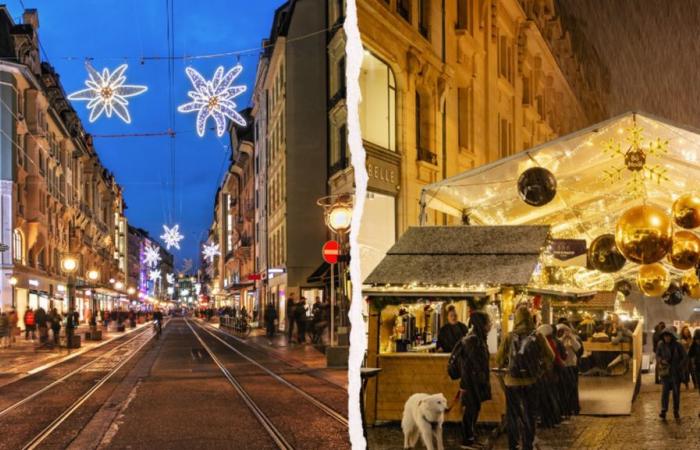A new analysis shows that prices for commercial space in prime locations in Swiss cities are high, and almost all space is rented. However, there are exceptions.
Stefan Ehrbar / ch media
The checkouts recorded good figures on Saturday on Zurich’s Bahnhofstrasse. According to data provider Hystreet, nearly 78,000 people strolled along this busy shopping street. This number is expected to increase in the coming weeks, given that the period leading up to Christmas is the most important for retail.
Among the most famous shopping streets, Bahnhofstrasse is no exception. Business is also doing well in the best locations in Basel, Bern or Geneva. This pleases landlords: store rents are high and vacancy rates are low, according to new data from real estate services provider CBRE.
The vacancy rate for commercial space fell almost everywhere between the first and third quarters of this year. In the streets studied, it increased from 1.8 to 1.2% in Zurich, from 1.9 to 0.9% in Geneva and from 3.8 to 3.7% in Basel. In Lucerne, the vacancy rate fell from 3.5 to 2.6% in the shopping streets studied, while in Winterthur it fell from 3.1 to 2.1%. In Bern, they remained stable at 2.8%.
Of all the 28 Swiss shopping streets studied, the rate of vacant stores has decreased in the space of six monthsgoing from 2.4 to 2.1%. Exceptions are found in Lausanne, where this rate increased from 0.7 to 1.3%, still relatively low.as well as in St. Gallen. The city in eastern Switzerland is experiencing greater difficulties with the phenomenon of store closures: in Multergasse, the vacancy rate was already 5.7% at the end of March, and it increased further, reaching 8, 6% at the end of September.
The store offering is not not diverse
The fact that business is doing well in most major cities is also reflected in store rents.which remain constantly high. In Zurich’s Bahnhofstrasse, people continue to pay up to 11,000 francs per square meter per year for a 100 square meter store in a very good location. According to CBRE figures, Rue du Rhône in Geneva comes in second place with 6,500 francs, and the Schwanenplatz district in Lucerne comes in third with 5,000 francs.
The price remained stable at 2,800 francs per square meter on Freie Strasse in Basel, a relatively low amount. However, this should soon change: the renovation of this shopping street, which lasted several years, has recently been completed. Demand from brands wanting to open a store on this street is high, according to CBRE analysis. The “premium look” of the new street is particularly appreciated.
Success does not necessarily lead to a diverse offering. Well-known Swiss shopping streets often offer the same range of stores like H&M, Zara or Claire’s, whether they are located in Zurich, Bern or Geneva. Currently, 74% of the stores located on the 28 largest streets belong to a chain, that is, to a supplier with several stores. For 47% of stores, these are subsidiaries of suppliers operating in several countries. This figure has increased by another percentage point in the space of six months.
Counteract abandonment city centers
However, the relatively good situation in the big cities is deceptive. In less prominent areas and in small towns, the situation sometimes remains difficult. Online commerce, stimulated by new low-cost suppliers from China such as Temu or Shein, but also increased teleworking and shopping tourism which resumed after the Covid crisis, is undermining certain small town centers .
To counter the abandonment of city centersmany cities have created contact points responsible not only for managing the rental of vacant stores, but also for the general revitalization of urban centers. In Lucerne, a “City Manager” has been in post for several months, in contact with the owners of the premises. The city is in a relatively comfortable position: only 24 of the 1,250 ground floor premises in the city center are currently vacant.
The situation remains difficult
A similar position was created in Aarau four years ago. The new location of the Nikin clothing store or the establishment of the Tibits restaurant chain are due to the initiative of the City Manager, Aarau City Mayor Hanspeter Hilfiker recently said in an interview with SRF.
Throughout Switzerland, stationary commerce is, however, holding up well. According to figures from the CRIF information service, nearly 27,000 stores have been closed over the past ten years, mainly stores offering clothing, magazines or consumer electronics.
During the same period, just over 32,000 stores were created, which represents a net growth of more than 5,000 stores. While between 2014 and 2016 as well as in 2019, the total number of stores that disappeared was greater than that of openings, since 2020 we have seen a recovery.
Translated and adapted by Noëline Flippe
The news in Switzerland is here
Show all articles






